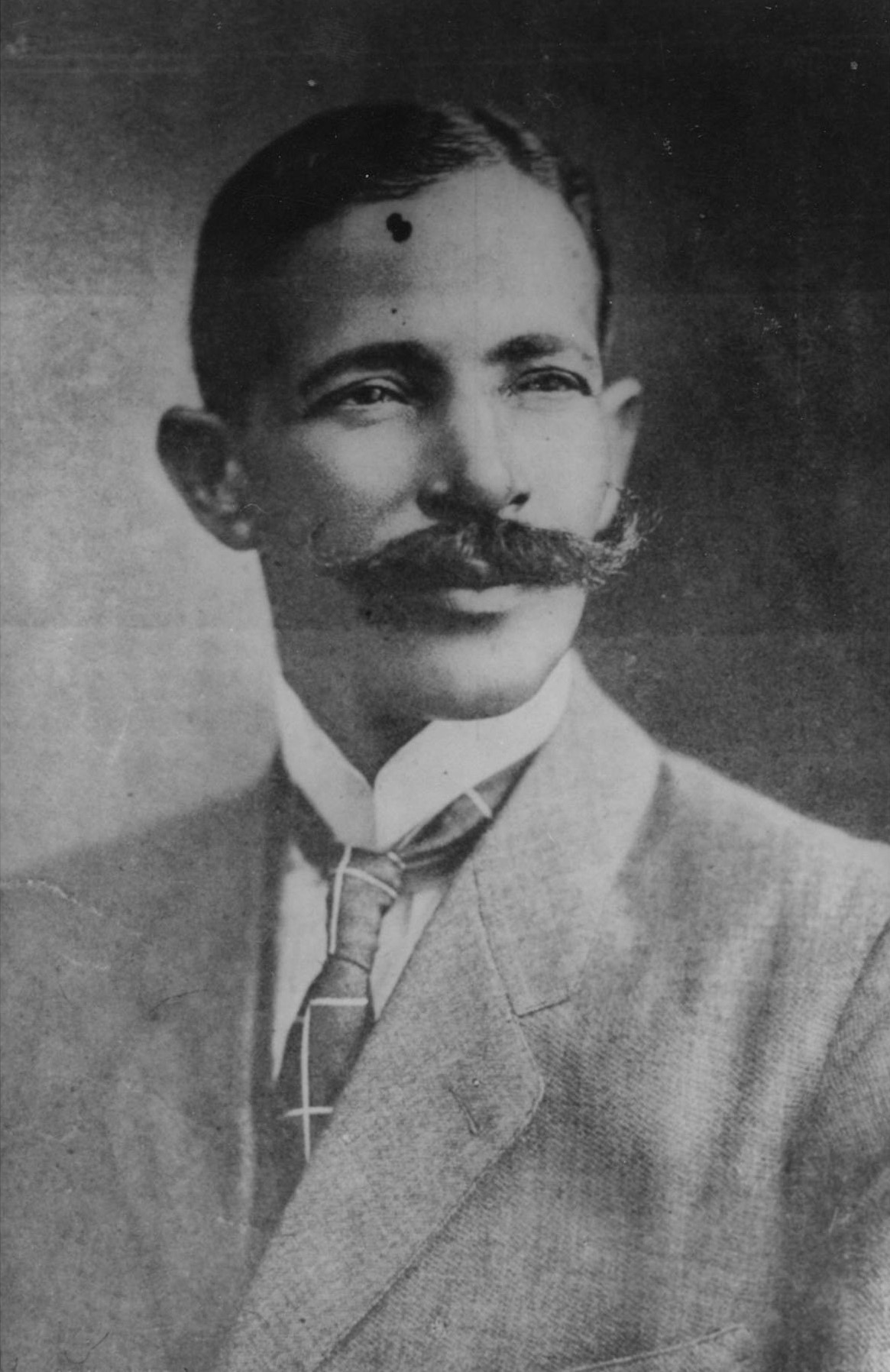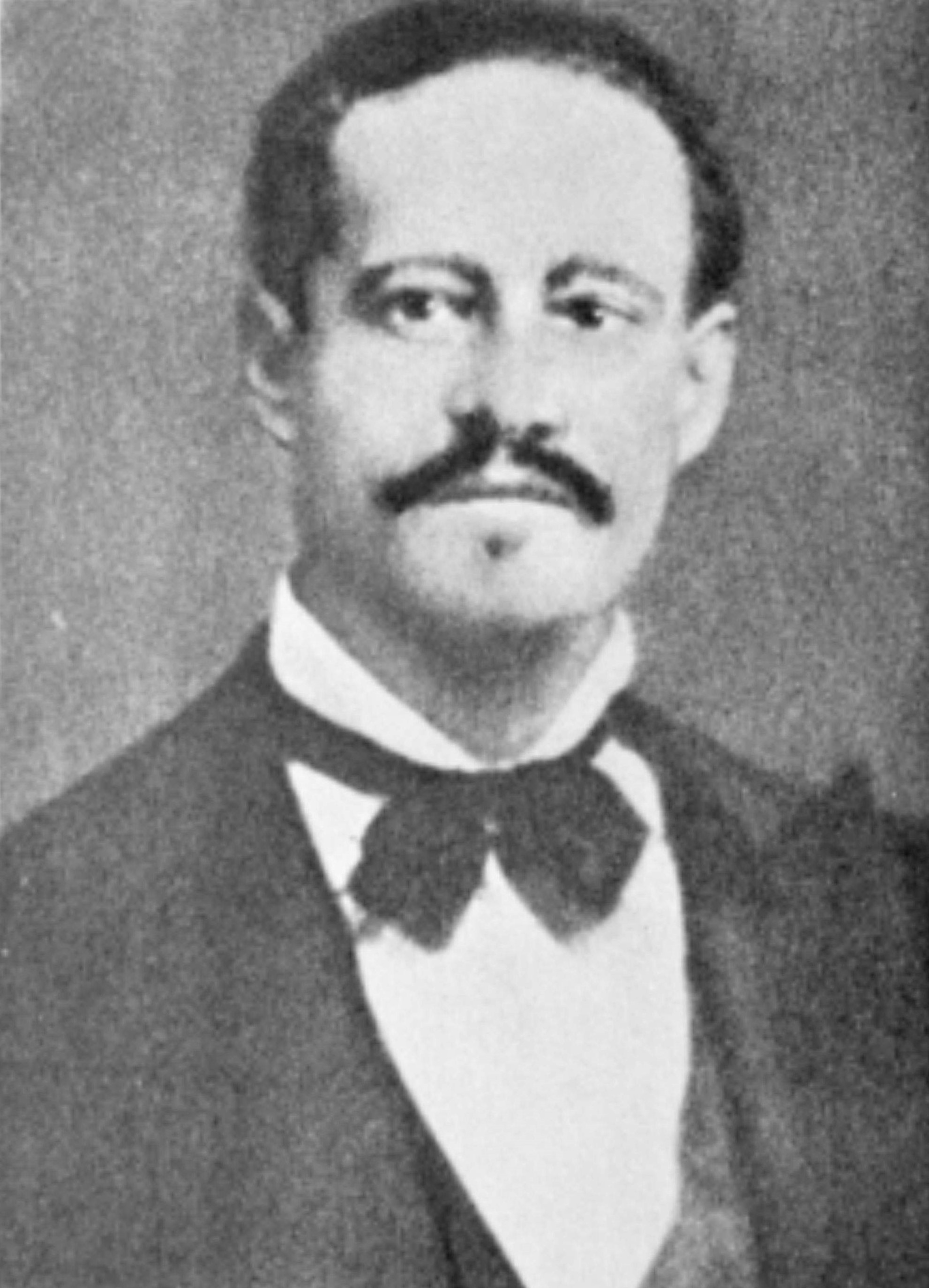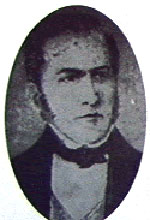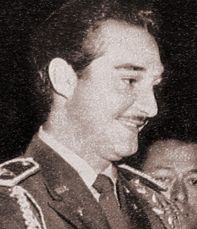 W
WColonel Juan Bautista Alfonseca Baris was a military officer and composer in the Dominican Republic, known for his role in the development of merengue music. Though the music written by Alfonseca was not, at the time, specifically labeled as "merengue", its incorporation of Dominican folk motifs into Latin formal music such as the danza paved the way for that genre, causing many to label him "the father of merengue".
 W
WPablo Alí was a chief military commander of Haitian origin, who was in charge of the so-called Battalion 31 or Batallon de Morenos, freed slaves which joined the ranks of the Dominican army. Alí directed the battalion to participate in the Italian rebellion of 1810, during the government of Sánchez Ramírez. He was said to have been "most prominent, achieving great military distinction in Santo Domingo".
 W
WDesiderio Arias Álvarez (1872–1931) was a notable Dominican soldier and caudillo who gained a significant following throughout the northern band of the Dominican Republic, especially in the Montecristi region.
 W
WRamón Buenaventura Báez Méndez, better known as Buenaventura Báez, was the President of the Dominican Republic for five nonconsecutive terms. He is known for attempting to annex the Dominican Republic to other countries on several occasions. His son Ramón Báez was briefly president in 1914.
 W
WCol. Francisco Alberto Caamaño Deñó was a Dominican soldier and politician who took the constitutional presidency of the Dominican Republic during the Civil War of 1965. He was the son of General Fausto Caamaño Medina; his father was cousin of Juan Pablo Medina de los Santos, the father of both President Danilo Medina Sánchez and House Speaker Lucía Medina Sánchez.
 W
WManuel Altagracia Cáceres y Fernández, sometimes called Memé was a Dominican politician. He served as president of the Dominican Republic from January 3, 1868 until February 13, 1868. He also served as General-In-Chief of the Dominican Republic from January 22, 1874 to April 6, 1874.
 W
WAntonio Duvergé Duval (1807–1855) was a Dominican general of French origin who famously served in the Dominican War of Independence.
 W
WJosé Gabriel García was a Dominican military, historian, politician, journalist and publisher. He is regarded as a cultural pioneer as well as the "Father of Dominican History". He is the author of "Compendium of History of Santo Domingo" written in four volumes in 1867, 1887, 1900 and 1906 respectively and made numerous contributions in the fields of culture, literature and education.
 W
WMáximo Gómez y Báez was a Dominican Major General in Cuba's Ten Years' War (1868–1878) against Spain. He was also Cuba's military commander in that country's War of Independence (1895–1898). He was known for his controversial scorched-earth policy, which entailed dynamiting passenger trains and torching the Spanish loyalists' property and sugar plantations—including many owned by Americans. He greatly increased the efficacy of the attacks by torturing and killing not only Spanish soldiers, but also Spanish sympathizers. By the time the Spanish–American War broke out in April 1898, Gómez had the Spanish forces on the ropes. He refused to join forces with the Spanish in fighting off the United States, and he retired to a villa outside of Havana after the war's end.
 W
WUlises Hilarión Heureaux Lebert nicknamed Lilís, was president of the Dominican Republic from 1 September 1882 to 1 September 1884, from 6 January to 27 February 1887 and again from 30 April 1889 maintaining power between his terms until his assassination by Ramon Caceres.
 W
WMajor General Antonio Cosme Imbert Barrera was a two-star army general advitam of the Dominican Army and was President of the Dominican Republic from May to August 1965.
 W
WDivisional General José María Bartolomé Imbert Duplessis (né Joseph Marie Barthélemy Imbert; was a French-born Dominican military figure and a mayor of Moca.
 W
WManuel José Jimenes González was a military figure and politician in the Dominican Republic. He served as the second President of the Dominican Republic from September 8, 1848 until May 29, 1849. Prior to that he served as the country's Minister of War and Marine Affairs.
 W
WLuis Marcano was a Dominican general of the Cuban Army during the Ten Years' War.
 W
WGregorio Luperón was a Dominican military general and statesman who was one of the leaders in the restoration of the Dominican Republic after the Spanish annexation in 1863.
 W
WModesto Díaz (1826–1892) was a Dominican Major General of the Cuban Liberation Army. He was a member of the Spanish Army in his country of origin during the Dominican Restoration War (1863–1865). He settled in Cuba and was reinstated to active service after the Carlos Manuel de Céspedes uprising. At the suggestion of Luis Marcano, he went to the side of the Cubans, and conducted several victorious battles against the Spanish during the Ten Years' War (1868–1878).
 W
WPedro Antonio Pimentel y Chamorro was a Dominican military figure and politician. He served as the 9th president of the Dominican Republic from March 25, 1865 until August 4, of that year. He also served as governor of Santiago de los Caballeros, Minister of War, and as a deputy of the Congress of the Dominican Republic. He was born to father Jacinto Pimentel and mother Juana Chamorro. He died sick and without any money in Quartier-Morin, Haiti in 1874.
 W
WManuel de Regla Mota y Álvarez was a Dominican military figure and politician. He served as the 5th president of the Dominican Republic from May 26, 1856 until October 8, 1856. Prior to that he served as the country's vice president under Pedro Santana.
 W
WJosé Rufino Reyes y Siancas was a Dominican composer, known for writing the music in the Dominican national anthem. Among his other works are compositions of waltzes and marches. He also wrote secular and religious music.
 W
WSantiago Rodríguez Masagó, also known as Santiago Rodríguez, nicknamed "Chago" was a Dominican military leader. Little is known of his birth but sources suggest that he was either born in Cap-Haïtien or the area of Fort-Liberté. He is known for having opposed the annexation of the Dominican Republic to Spain and then having fought the Spanish Crown; and for being one of the rebels of the famous El Grito de Capotillo that began the Dominican Restoration War with General Gregorio Luperón.
 W
WJuan Sánchez Ramírez (1762–1811) was a Dominican soldier and a Captain general who ruled the modern Dominican Republic between 1808 and 1811, and commanded the troops that fought against the French rule of Santo Domingo´s colony between 1808 and 1809 in the Battle of Palo Hincado, resulting in a victory over the French, and the return of Santo Domingo to Spanish hands.
 W
WFrancisco del Rosario Sánchez was a politician, national hero and founding father of the Dominican Republic. He is considered by Dominicans as the second leader of the 1844 Dominican War of Independence, after Juan Pablo Duarte and before Matías Ramón Mella. The Order of Merit of Duarte, Sanchez and Mella is named in honor of these men.
 W
WPedro Santana y Familias, 1st Marquis of Las Carreras, better known as Pedro Santana, was a Dominican military commander and royalist politician who served as the president of the junta that had established the First Dominican Republic, a precursor to the position of the President of the Dominican Republic, and as the first President of the republic in the modern line of succession. A traditional royalist who was fond of the Monarchy of Spain and the Spanish Empire, he ruled as a governor-general, but effectively as an authoritarian dictator.
 W
WHéctor Bienvenido "Negro" Trujillo Molina was a Dominican general and political figure who was the President of the Dominican Republic between 1952 and 1960. He was the brother of former president and dictator Rafael Trujillo.
 W
WRafael Leónidas Trujillo Molina, nicknamed El Jefe, was a Dominican dictator who ruled the Dominican Republic from February 1930 until his assassination in May 1961. He served as president from 1930 to 1938 and again from 1942 to 1952, ruling for the rest of the time as an unelected military strongman under figurehead presidents. His 31 years in power, to Dominicans known as the Trujillo Era, are considered one of the bloodiest eras ever in the Americas, as well as a time of a personality cult, when monuments to Trujillo were in abundance. Trujillo and his regime were responsible for many deaths, including between 12,000 and 30,000 Haitians in the infamous Parsley massacre.
 W
WRafael Leónidas Trujillo Martínez, better known as Ramfis Trujillo Martínez, was the son of Rafael Leónidas Trujillo, dictator of the Dominican Republic, after whose 1961 assassination he briefly held power. Nominally an army general, he lived the life of a reckless and spoiled playboy like his friend and sometime brother-in-law Porfirio Rubirosa. Remembered for his ruthlessness and cruelty, he went into exile in Spain, where he died after crashing a sports car.
 W
WFernando Valerio Gil was an agriculturalist and soldier from the Dominican Republic. He is considered a hero of the battles of Santiago —together with José María Imbert—, and Sabana Larga —together with Juan Luis Franco Bidó—. He was commander in chief of the northern border.
 W
WJosé Desiderio Valverde Pérez was a Dominican military figure and politician. He served as president of the Dominican Republic from June 13, 1858 until August 31, 1858.
 W
WFelipe Horacio Vásquez Lajara was a Dominican general and political figure. He served as the president of the Provisional Government Junta of the Dominican Republic in 1899, and again between 1902 and 1903. Supporters of Vásquez were known as Horacistas, as opposed to Jimenistas, supporters of Vásquez's main rival, Juan Isidro Jimenes. He ran for a full term as president in 1914, but lost to Jimenes.